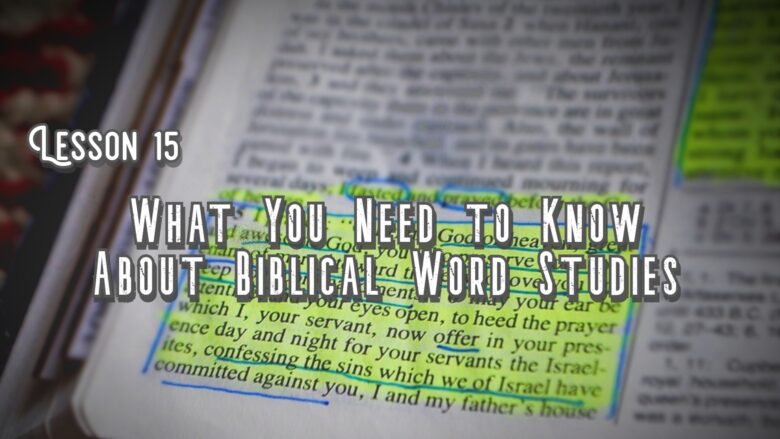Lesson 5 promised there would be a lesson on the use of Bible dictionaries and the sort related to word studies. This is that lesson.
Disclaimer!
This Bible study is not a tutorial for using a Bible dictionary, concordance, or encyclopedia. If you would like to learn this skill, I recommend reading James Smith’s Introduction to Biblical Studies. Chapter 5 of that book is entitled, “Working With Biblical Words,” (67-90). Afterwards, get your hands on a Bible dictionary (lexicon) and read the front cover introduction on how to use the tool. This lesson is more about the science of word studies: things to keep in mind and pitfalls to avoid.
Introduction
Word studies are the all-time favorite of many teachers. While there is a time and place for word studies, some can strangle the art to death. To be more straightforward, word studies are helpful and complimentary to studying a verse of scripture or even an entire topic, but Bible study consists of more than finding every occurrence of a given word in scripture. Arbitrary studies such as, “Rocks in the Bible,” that dryly go through all the different types of rocks mentioned in scripture might prove interesting to some geologists but spiritually lacks meaningfulness. This particular type of study stems from the misappropriation of a word study tool called the concordance which will be examined last in this lesson. Even if you are not a teacher at church or a leader of Bible studies, you may be wondering how to go about identifying the meaning of a word in the Bible. This can prove very helpful. You don’t have to be a Hebrew or Greek scholar, but you do need a basic understanding of languages, literature, and lexicons.
Four Principles for Word Studies
Greek & Hebrew
The Bible was originally written in Hebrew (Old Testament) and Greek (New Testament). There are even a couple of Old Testament books written in Aramaic originally. This fact should highlight the ever-present need for defining biblical words. The English language has changed quite a bit since the first Greek to English Bible was penned by William Tyndale (1525-1526). Even if it had not changed, a single Greek or Hebrew word might have four or five English synonyms. The question then becomes, which English word best captures the original meaning of the Greek word in a given Bible passage? For example, the single Greek word “pneuma” has at least the four following definitions in English according to Thayer’s lexicon: 1) wind 2) the vital principle by which the body is animated 3) the conscious soul distinct from the body 4) God’s Spirit, often called the Holy Spirit. With four possible renderings, how should the single Greek word be translated in 1 Timothy 4:1? There is another basic principle needed to answer this question.
Context
When a Greek Lexicon (i.e. Thayer, Liddell-Scott, Bauer-Arndt-Gingrich-Danker, etc.) says the word “pneuma” in 1 Timothy 4:1 is best rendered as “Holy Spirit” in the English, they are making an interpretation based largely on the surrounding context and a strong knowledge base of how the word is used elsewhere in the Bible and even non-biblical, contemporary literature. That is right, context again plays a major role. The surrounding context can give a word like “pneuma” a different shade of meaning in one passage as opposed to another. While it can be translated “wind,” what kind of wind did the author intend to convey- breath or a strong gale? Thus, the lexicons will give very long lists for each Greek and Hebrew word, not only listing each possible definition, but also identifying the different shades of meaning for that definition. Ample Bible verses are then cited where the word is best rendered with that shade of meaning. John 3:8 is a very controversial verse where pneuma appears and the Bible student will have to reference several lexicons, compare several other passages where the word is used, and furthermore rely on a solid Bible knowledge base to make an educated interpretation as to how the Greek word should be translated: wind or spirit?
It’s Not a Buffet
The scholars that authored lexicons such as Liddell & Scott Greek Lexicon dedicated years of their life in order to give commoners an educated decision for interpreting Bible words. All that to say this, it is lazy, careless, and dangerous to pick a specific definition simply because it suits your personal bias on a doctrinal argument. For example, the Greek word “eis” can be rendered “for/unto” or “because of”. The Amplified Bible is the only English translation to translate the word “eis” in Acts 2:38 the following way, “Be baptized…because of (eis) the forgiveness of sins.” Every other English translation properly translates Acts 2:38, “Be baptized…for (eis) the forgiveness of sins.” How the word is translated into English completely changes the understanding of baptism’s purpose. The Amplified Bible’s translation committee believes baptism does not wash away sins; thus, they unscrupulously translate the Greek word in Acts 2:38 to fit their doctrinal bias. Word studies and Bible translation is not a buffet to pick and choose the definitions as you wish. Souls may hang in the balance in some situations.
Concordances Are Not All-Sufficient
Concordances list all the findings for any given word in the Bible. Consider the word “temple.” You can look this word up in a concordance and find every place it is used in the Bible. However, this does not lend to an exhaustive study of the topic. Study will show that the Garden of Eden meets all the qualifications of a temple, but the word “temple” is never used in Genesis 1-3. This is true of many biblical words and concepts. Thus, a word study is good and helpful, but a strict word study is still insufficient in itself.
Conclusion
This is a vast subject. This lesson will hopefully present good guidelines to follow when starting out on word studies. This part of Bible study is just like anything else, it takes practice, and practice makes perfect. The art of word studies is not particularly difficult with a little practice, though some words can present great difficulty. Listed below are some helpful word study resources that can be accessed on the internet.
Homework Questions
1. What is another name for a biblical dictionary?
2. What primary language was the Old Testament originally written in?
3. What primary language was the New Testament originally written in?
4. Who translated the New Testament from Greek into English for the first time, and when did this take place?
5. True or False:
However a Greek word is translated into English in one passage, it is safe to assume the same Greek word takes on the same meaning in the next passage where it appears?
Free Online Resources
- blueletterbible.org***
- studylight.org
- e-Sword
- biblestudytools.com
***This website is a very user-friendly and resourceful online help. Blueletterbible.org has a built-in concordance, Strong’s and Thayer lexicons, Bible dictionaries, interlinear translation, Treasury of Scripture Knowledge cross reference tool, and Bible translation comparison tool, along with other free Bible charts and study aids.



